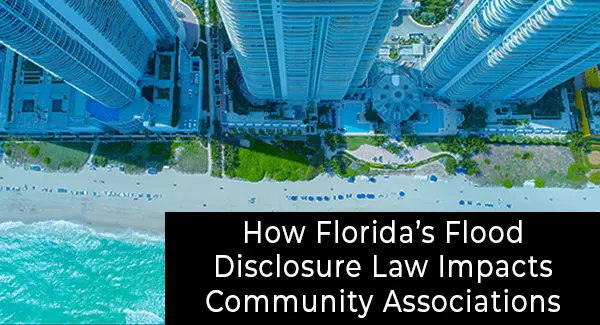- Community Associations
- Florida
Florida’s evolving flood disclosure regulatory landscape and the Federal Emergency Management Agency’s (FEMA) ongoing flood map updates have had substantial implications for condominium, homeowner (HOA), and townhome community associations.
Recent updates to FEMA’s flood risk mapping protocols have expanded high-risk zones, reclassifying some neighborhoods into different flood zone types. These new maps may affect building codes and reserve studies, prompting associations to consider elevating structures or installing mitigation systems.
Boards members, property managers, and community leaders must understand these changes to manage liability, insurance requirements, along with current and prospective member relations.
Florida’s Flood Disclosure Law
Florida’s HB 1049 (codified as F.S. § 689.302) is a state law that took effect on October 1, 2024. The law requires sellers of residential property to disclosures providing explicit flood risks before a sales contract is signed. The disclosures must:
- Clarify that standard homeowners insurance excludes flood damage.
- Explicitly reveal flood insurance claims.
- State if federal flood relief and/or FEMA aid was received.
While this law primarily targets individual residential property sellers, it also has noteworthy implications for Florida community associations, especially concerning document management, governance, and buyer relations.
Flood and Community Association Insurance
FEMA flood map changes not only impact land use and construction planning, they also directly affect the insurance obligations of associations and individual unit owners. For example, properties located in a FEMA-designated high-risk flood zone or a Special Flood Hazard Area (SFHA) may need to carry flood insurance for owners with federally backed mortgages.
For Florida HOAs and condo associations, especially those in coastal or low-lying areas, this means revisiting the scope of existing insurance coverage, premium budgeting, and potential gaps in protection for common elements and/or shared structures.
Lenders may also require associations to obtain or expand flood insurance policies as a condition for financing, especially if structures (ex. clubhouses, lobbies, garages, elevators) are affected by flood zone reclassification. These adjustments can significantly affect association budgets, reserve planning, and overall risk exposure.
Why This Matters to Florida Community Association Board Members
Misrepresentation of flood history (even unintentionally) can invite legal disputes with buyers or owners. Several best practices include:
- Updating re-sale packages to notify potential buyers of required flood disclosures, noting seller versus association responsibilities
- Implementing checklists in the resale process to ensure flood disclosures are not absent which could otherwise delay closings or expose the association to complaints.
- Ensuring unit-owner flood disclosures and relevant forms comply and align with legal obligations.
- Revising governance documents or addendums to explicitly require the flood disclosure form in resale procedures.
Additionally, associations should consider flood disclosure education for members who are selling and refinancing their units.
Legal Resource
For Florida community associations, staying ahead of flood disclosure mandates and FEMA map changes is more than legal box-checking – it is vital to protecting communities. Proactive action on disclosures, insurance, communication, and mitigation will help boards and community association managers navigate this evolving risk landscape confidently, reduce post-sale disputes, and enhance trust.
Associations should consult legal counsel to resolve potential issues, owner disputes, and buyer requests. The association’s attorney can ensure compliance with current governing documents, verify those documents are up to date, and confirm that all forms and communications minimize the risk of liability.
Questions about flood disclosures, board member responsibilities, or other legal concerns? Do not hesitate to contact our law firm.
Please call 855-537-0500 or visit www.ksnlaw.com.
Since 1983, KSN has been a legal resource for condominium, homeowner, and townhome associations. Additionally, we represent clients in real estate transactions, collections, landlord/tenant issues, and property tax appeals. We represent thousands of clients and community associations throughout the US with offices in several states including Florida, Illinois, Indiana, and Wisconsin.
Please note the material contained in this article is for educational and informational purposes only and does not constitute legal advice. No attorney-client relationship is established by your review or receipt of the information contained in this article. You should not act on the information discussed in this article without first obtaining legal advice from an attorney duly licensed to practice law in your State. While KSN has made every effort to include up-to-date information in this article, the law can change quickly. Accordingly, please understand that information discussed in this article may not yet reflect the most recent legal developments. Material is not guaranteed to be correct, complete, or up to date. KSN reserves the right to revise or update the information and statements of law discussed in the article law at any time, without notice, and disclaims any liability for your use of information or statements of law discussed on the article, or the accessibility of the article generally. This article may be considered advertising in some jurisdictions under applicable law/s and/or ethical rules/regulations. © 2025 Kovitz Shifrin Nesbit, A Professional Corporation.


